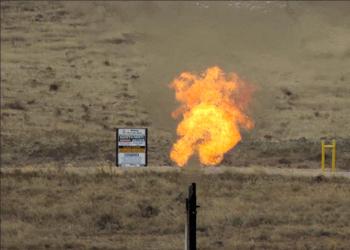
WASHINGTON, DC, July 4, 2017 (ENS) – A federal appeals court has ruled that the U.S. Environmental Protection Agency does not have the authority to suspend a rule restricting methane emissions from new oil and gas wells imposed during the Obama administration.
In a split 2-1 ruling, the three-judge panel of the U.S. Court of Appeals for the District of Columbia Circuit ordered the EPA to move ahead with the requirement that aims to reduce heat-trapping emissions of methane, a greenhouse gas 22 times more potent than carbon dioxide.
The leak detection and repair requirements were scheduled to take full effect on June 3. EPA Administrator Scott Pruitt said in April that he would delay by 90 days the deadline for oil and gas companies to follow the new rule, so that the agency could reconsider the requirement.

The American Petroleum Institute, the Texas Oil and Gas Association and other industry groups petitioned Pruitt to jettison the requirement, set to apply in June, claiming the need for more regulatory certainty before the methane emissions limit is enforced.
In May, Pruitt announced he had decided to extend the 90-day stay for two years.
Pruitt issued the 90-day stay without advance public notice or opportunity for public comment, as required by law. This is the first step the EPA is taking to dismantle methane standards; the stay notice indicates that Pruitt he would soon propose to extend the stay indefinitely.
Six environmental groups opposed the delay in court, asking the judges to halt Pruitt’s decision.
In its ruling, the court disagreed with Pruitt’s argument that industry groups had too little opportunity to comment before the 2016 rule took effect. The judges said Pruitt lacked the legal authority to delay the rule.
“E.P.A.’s stay, in other words, is essentially an order delaying the rule’s effective date, and this court has held that such orders are tantamount to amending or revoking a rule,” wrote Judges Robert Wilkins and David Tatel. Judge Janice Rogers Brown dissented.
The majority judges said that the agency had the right to reverse the methane regulations but that the agency would have to undertake a new rule-making process to undo the Obama administration’s regulation.
An EPA spokesperson said the agency is reviewing the ruling and considering its options.
President Donald Trump announced the rollback in late May, just before withdrawing the United States from the Paris Agreement on climate.
“In its haste to do favors for its polluter cronies, the Trump EPA has broken the law,” said Meleah Geertsma, senior attorney at the Natural Resources Defense Council, NRDC, one of the appealing groups.
“The Trump administration does not have unlimited power to put people’s health in jeopardy with unchecked, unilateral executive action like this,” Geertsma said. “Stopping methane leaks is a no-brainer—avoiding wasted gas, creating jobs, fighting climate change and cutting cancer-causing pollution all at once. We will not stand for this blatant polluter giveaway.”
NRDC, together with Clean Air Council, Earthworks, Environmental Defense Fund, Environmental Integrity Project and Sierra Club, filed the lawsuit.
The Trump administration violated the Clean Air Act in suspending critical protections against methane leaks and other dangerous air pollution from the oil and gas industry last week, the groups claimed.
Based in Pennsylvania, Clean Air Council says the delay of the EPA’s standards, and their possible subsequent rollback, would affect 800 wells in Pennsylvania alone, “creating more than 500 tons of methane pollution and 140 more tons of smog-forming and health-threatening toxic chemicals in the air.”
Joseph Otis Minotte, executive director and chief counsel of the Clean Air Council, said, “President Trump and his EPA are sending a very clear message that they care more about protecting polluters than people.”
This is the first lawsuit against President Trump’s Environmental Protection Agency over rollbacks of federal efforts to fight climate change.
Copyright Environment News Service (ENS) 2017. All rights reserved.
© 2017, Environment News Service. All rights reserved. Content may be quoted only with proper attribution and a direct link to the original article. Full reproduction is prohibited.
